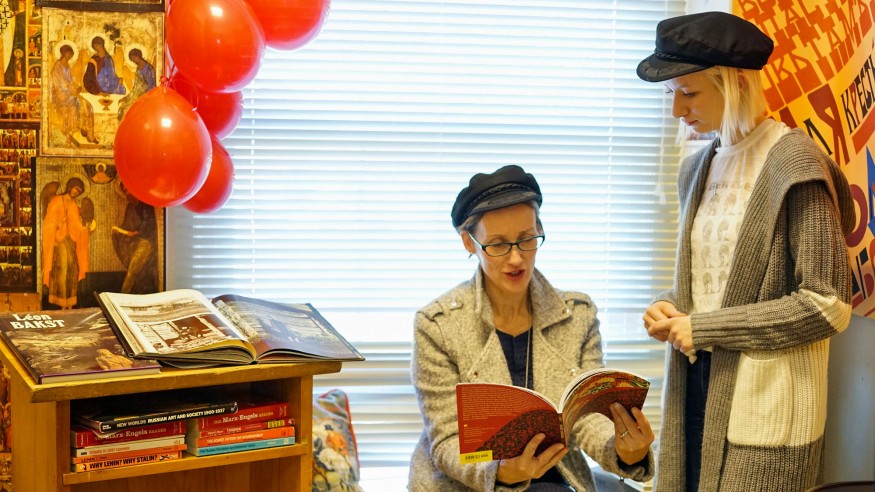
‘Reflecting the Russian Revolution’
Comparative Literature Department Commemorates 100th Anniversary of Bolshevik Revolution
One hundred years later, and the revolution still is not being televised. But comparative literature professor Stephanie Merkel is helping to ensure its visibility on the Ohio Wesleyan University campus.
Merkel, along with fellow comparative literature professor Sally Livingston, organized a week of “Reflecting the Russian Revolution” events Nov. 7-10 to commemorate the 100-year anniversary of the Bolshevik Revolution.
Merkel and Livingston, both Russian scholars, were shocked to see the Russian government had no events planned to commemorate the anniversary. After searching the internet, they discovered Project 1917, a grassroots, online organization of journalists and historians working to keep the Bolshevik Revolution and Russia’s history in the public view.
Inspired by Project 1917’s Facebook-style format, in which members posted first-hand historical accounts of Russian citizens from the era, Merkel and Livingston decided to help remember the past and educate students about the importance of Russia’s revolutionaries.
History professor Mark Gingerich also took part in the week’s events, participating in an interdisciplinary panel discussion on the Bolsheviks that also included Merkel and politics and government professor Sean Kay.
“I enjoyed the opportunity to discuss history with students outside of the classroom setting,” Gingerich said. “It’s really nice to see so many students involved in extracurricular activities such as this.”
Gingerich has training in Russian, Soviet, and German history. “Hopefully, I was able to answer questions of a historical nature, and provide historical context for the various issues discussed at the panel session,” he said. “Even if students don't remember all the details, at least they might come away from the session with a sense that history and the historical context matter profoundly.”
English and Medieval Studies major Jordan Waterwash ’18 said she especially enjoyed going to the Nov. 8 lecture about Russian art.
“Art isn’t really something I think about when the Russian Revolution comes to mind, but now I know how incredibly impactful art – and women in art specifically – was during such a turbulent time,” she said.
As part of the festivities, Merkel converted a supply closet in Sturges Hall into a time machine to Russia in 1917. The closet contained memorabilia from the Revolution, poetry and novels written within the year, copies of “The Transcript” from Nov. 7, 1917, and different works of art.
The week of “Reflecting the Russian Revolution” events included:
- Nov. 7 – Screening of Dziga Vertov’s “Man with a Movie Camera,” often called the 8th greatest movie ever made. The 1929 documentary was made by a Russian citizen who traveled around the cities of Odessa, Kiev, Moscow, and Kharkov with a camera, documenting urban daily life.
- Nov. 8 – “The Revolution before the Revolution: The Art Bureau of Nadezhda Dobychina,” a lecture presented by Mimi Ginsberg, doctoral candidate at the University of Maryland. The lecture was a dual event with the Department of Fine Arts.
- Nov. 9 – “The Bolshevik Revolution of 1917: What Was Good? What Was Bad? Is It Over?” a faculty panel discussion. Prompted by a call-out from Gingerich, professor of history Michael Flamm briefly joined the panel (from his seat in the audience) to answer how the Bolshevik Revolution influenced American politics and culture.
- Nov. 10 – “Writing the Revolution: A Granddaughter’s Tale,” a lecture by professor Anne Sokolsky, chair of the Department of Comparative Literature. Sokolsky discussed her grandfather George Sokolsky, a journalist in China during the turbulent decades of the 1920s and 1930s, who later became a syndicated columnist in over 200 newspapers in the United States during the heyday of print journalism.
